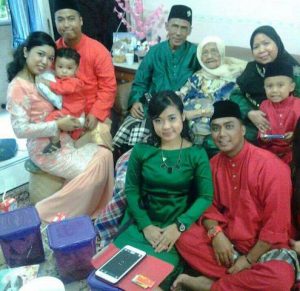Empty in the nest
A couple shares their woes when their three children left the home, and how a social experiment helped them regain their intimacy.
Most Singaporean married couples go through their lives in phases. After completing school, a typical Singaporean would work hard at his or her career, find a boyfriend or girlfriend along the way, save some money for a flat and a wedding, have and raise their children, and watch them grow up, complete their education and move onto their careers. Sadly, before they know it, their children have left their homes to get married, go abroad or live on their own. This is exactly what happened to couple Sri Prachoyo Bin Sri Sudarso, 61, and his 52-year-old wife Normah Bte Kassim, who have been married for 32 years.
Their attention was often focused on their work and making sure their family including three children were cared for. Prachoyo was an odd-job labourer, but later found it did not bring in a stable income to sustain his family. To help ease their financial woes, Normah pitched in, working nightshift as a factory worker on the production line. She shared: “We would not see each other at home – sometimes for days – as he would be asleep when I was preparing for work and vice versa. Money was tight, but our children understood our challenges.”
This continued till 2001 when Normah took a library assistant job and in 2003, Prachoyo moved on to be a personal driver. Things continued until 2009, when their son got married and three years later, their daughter got married. Also at that time, their remaining daughter was studying for a diploma and was spending most of her time buried in books and at tuition, in addition to working full-time as a PE teacher.
Normah said, “We truly felt the empty nest syndrome (a feeling of grief and loneliness when children leave home for the first time) when they left as we were rather close-knit. We used to go everywhere together, do household chores together and have most of our meals together. When the children started working, they began contributing to the household income so we managed to upgrade from an L-shaped flat to a four-room flat. We now see them a few times a month at most for meals and shopping; previously we saw them at home daily.”
The environment also was a contributing factor to their loneliness. She added: “Also, being in the four-room flat is definitely less “cosy” than being in an L-shaped apartment, and although we enjoyed the extra room after they have left, we still feel their absence.”
More challenges ahead
As the quietness set in and they tried to come to terms with it, other hurdles came to the fore. In late 2014, Prachoyo collapsed at work from a blood clot in his brain. Since then, he has had 11 head operations.
“When my husband returned for a check-up after he had been discharged from hospital in 2014, the doctor verified that he was no longer fit to discharge his duties as a personal driver, so he could not return to work as a driver,” said Normah.
Originally, she had plans to resume working as a library assistant after caregiving her husband, but she too chose to stop working. “It was my favourite job so far, but I was advised by our children not to resume working but to slow down and take care of our health. Additionally, the flat has already been paid off and our children are supporting us in some way or another, so there is no urgency for us to resume working,” she added.
A social experiment on re-connecting
This year, the two took part in a four-minute stare social experiment organised by insurer Prudential, an experiment inspired by a study by Dr Arthur Aron of the State University of New York in 1997. Dr Aron’s study indicated that greater barriers could be broken down, and intimacy and empathy generated between people when they spend just four minutes looking into each other’s eyes. Twelve couples out of 69 pairs who auditioned were then selected to be filmed and posted on the Prudential website.
“In today’s world, ‘busyness’ has become somewhat of a badge of honour,” said Philip Seah, CEO of Prudential in Singapore. “We are constantly rushing, distracted by our phones and e-mails, barely taking time to acknowledge each other. What we hope to do is encourage people to take just a few minutes of their day, only four, and really focus on the people who matter to them.”
Added Angela Hunter, chief marketing officer, Prudential in Singapore, said, “When we first did the experiment, it was interesting to see the wave of emotions participants experienced – love, pride, sadness, happiness. But more importantly, we were humbled to hear them express the empathy they felt as they realised they had been missing a deeper understanding of that person they hold so dear.”
For Normah, she was called by a friend to participate in December 2015 and did not think much of it. “We thought it would be fun to go along and see if we could get picked to be filmed. We were quite surprised when we were selected from what seemed to me like hundreds of other couples – some of them were husband and wife, some were siblings, and others were parent and child. Although a counselling psychologist explained to us what was going to happen, there was no script at all so all our reactions were spontaneous.
“In the four minutes that we were in front of the camera, it flashed in my mind the four months that my husband was in the intensive care unit (ICU). Additionally, I do not have my children with me most of the time like I used to, so I felt a sense of loss and then relief that my husband had been discharged and returned to recuperate with me even if my children are not be around all the time,” shared Normah.
Added Prachoyo: “In the four minutes, I was reminded of our short courtship before we married. Looking at her reminded me that I have aged.”
Though it was a short experiment, the two gained much from it. Said Normah: “Because we had spent most of our lives working and bringing up our children, it made me think of the lost time that we could have spent together had our financial circumstances been better. After my husband was discharged from hospital, he became less chatty and more forgetful, so communication has been challenging. The experiment brought us closer together in that I am more attuned to his needs and feelings; I am now able to pick up and understand his feelings even if he is not articulating them. We look at each other when we have our meals at least; it’s less awkward like that!”
Asked what advice she would give other couples going through empty nest syndrome? “Learn from my mistake! Don’t wait till your better-half falls ill before you start communicating with him or her. If you can afford it, take each other out for meals and holidays without the children of course because he or she will be all you have left when the children are married and no longer living with you.”
Normah further advised: “Along the same vein, take good care of your health and go for your regular medical check-ups. For those who can’t afford meals and holidays, spend some time together – even if you are tired from work – over a meal or watching TV. Be giving of your time and resources; one way or another they will be returned to you manifold.”
** View Prachoyo and Normah’s VIDEO.



0 Comments